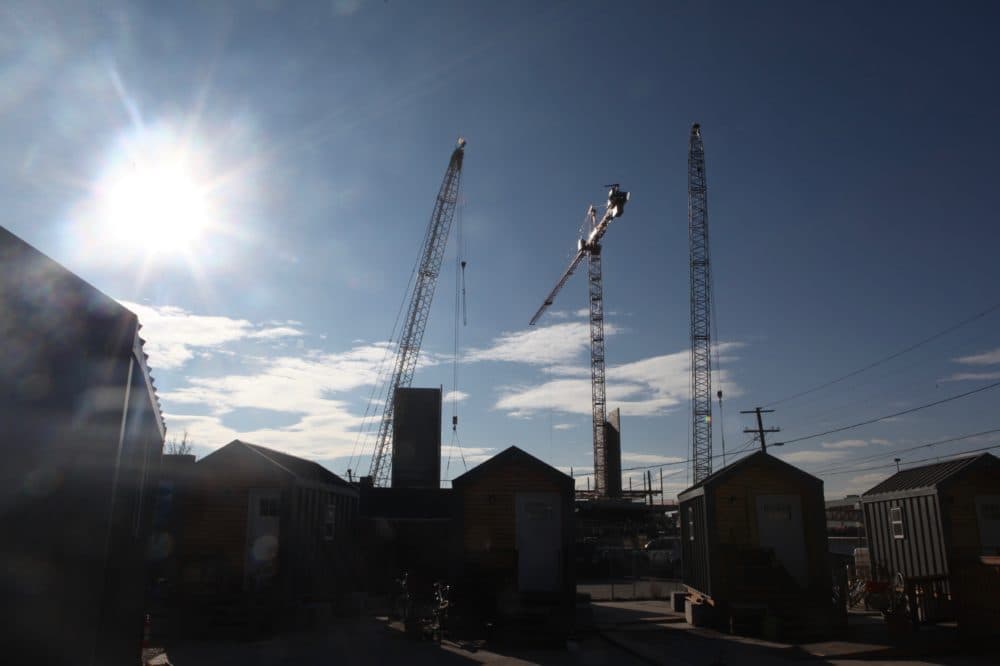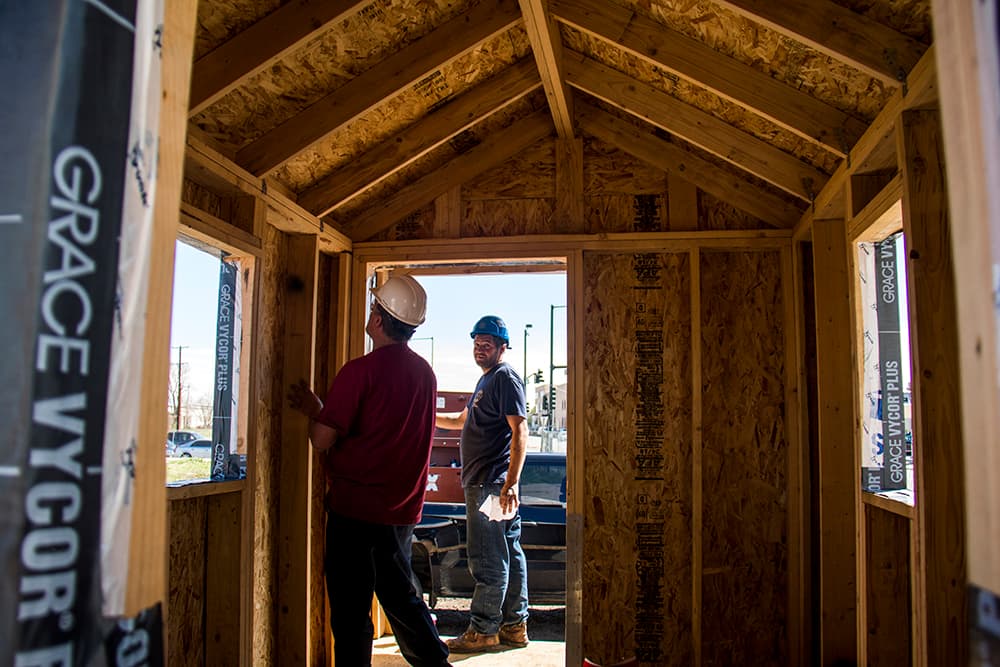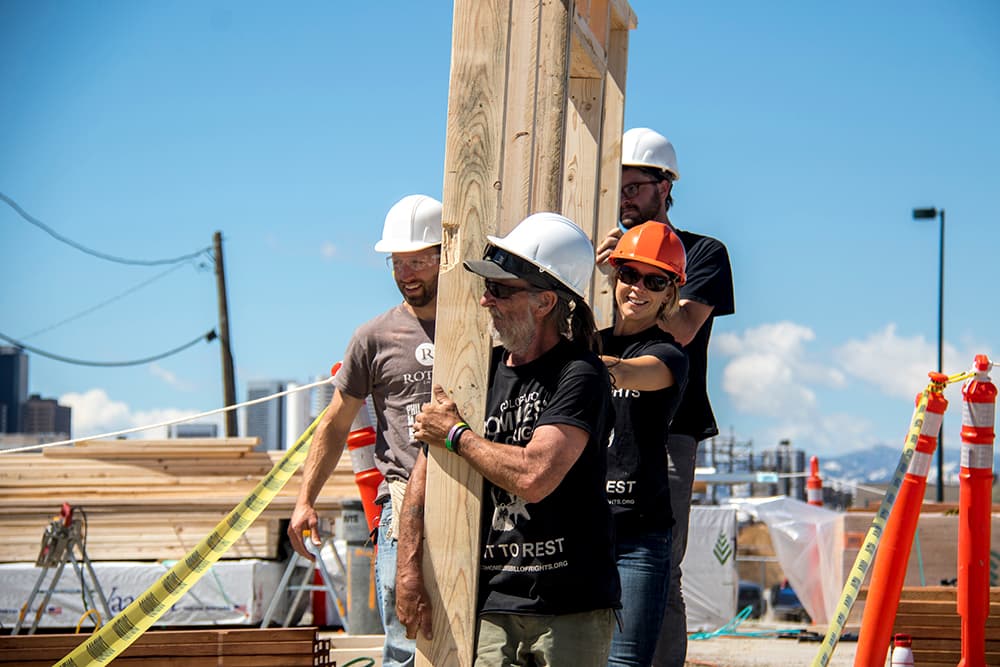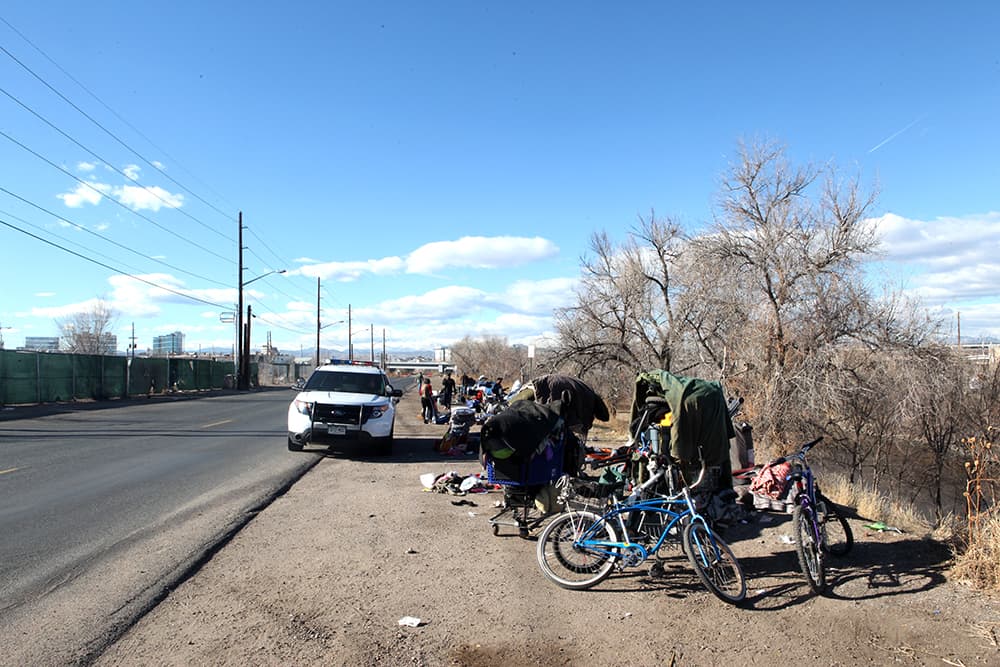
Amanda Lyall awoke in an abandoned lot on July 21 with police officers standing over her. Someone had spotted her make-shift sleeping spot and reported her to the cops.
This was, of course, the worst way to start a day. She felt a rush of despair and frustration. It was going to be another day on the streets of Denver, and she didn't know how many more she could handle.
"I was done," she recalled months later. "It's dehumanizing. It's scary."
Still, she kept her cool and shouldered her 80-pound bag as the officers watched that morning. Setting out through the summer morning, she made her way toward the city's northern edge. She had somewhere to be. She was going to learn whether her last hope might happen.
Lyall was heading for the corner of 38th Avenue and Walnut Street. When she arrived, she found a set of peak-roofed cabins on a dusty lot -- a village of tiny homes.
Somehow, among all Denver's construction cranes and new buildings, this modest piece of land had captured Denver's attention for months. Donors had given hundreds of thousands of dollars to get it built. The city government had changed rules to allow its construction. For weeks, volunteers from around the state had joined the future residents to build its eleven housing units.
Known as Beloved Community Village, it represents an enormous victory for the alliance that has redefined Denver's conversation about homelessness. This is Denver's first modern, legal housing community built by and for people experiencing homelessness.
"We’re trying to build community in a really radical way, and we’re doing it from the margins of society," said Cole Chandler, a young pastor and an organizer for the project. "We’re trying to seed a better world from the margins of society."
So far, it's working. In its first five months, the self-governed village has had precisely zero visits from police, according to city records. The only person who has left now lives in permanent housing. Most of its residents are employed. And its organizers are preparing a second village, part of a network that they hope could one day house hundreds of people in Denver.

That morning, walking toward the village's chain-link fence, Amanda Lyall felt a surge of hope.
She had been through so much since March, when she fled an abusive relationship and an addiction that had destroyed her life in Texas, she said. Like so many, she had come to Denver looking for a new start, only to find herself dumped outside by a brutal housing market.
"God clicked everything into place when I came to Colorado. He called me here. I was starting over. I was sober off drugs. I was right at my six-month sobriety," the 31-year-old recalled.
The only thing missing was housing -- and she didn't know yet whether she would be allowed to join this new community. She was one of three people in the running for the last two spots.
The place was abuzz, still looking a bit like a construction site.
Crews of volunteers from across the state had been working for weeks with the future residents to build the homes, each 96 square feet inside, plus porches, with shared restrooms. The community roundhouse wasn't done yet, and the certificate of occupancy wouldn't arrive until later in the day.
This was the result of months of organizing -- or longer, really. It was preceded by years of illegal prototypes -- some that had been hidden not far way, another that had stood defiantly on a city property before it was raided and demolished by the city less than two years earlier. Ten people were arrested at the time, including some of the Denver Homeless Out Loud organizers behind this new project.
Other efforts had died amid neighborhood objections and city zoning rules. The relationship between Mayor Michael Hancock's office and some of the homeless advocates had grown steadily worse, hitting rock bottom in December 2016 when a viral video showed police confiscating blankets from people sleeping outside the city and county building.
Now, there was change in the air. Hancock put his personal influence behind the project, showing up unannounced at a meeting between the village organizers and city staff.
"The mayor basically said, 'What do you want?' And we said, 'Well, we want a lot of things. We have this piece of land that we would like to organize a community on,'" Chandler recalled.
"His office left that meeting giving the community planning department the directive to 'Get to yes.'" Hancock's office confirmed the account.

The idea grabbed Denver's attention.
It was only eleven homes, but it felt as if the idea had tapped something deeper. Every story about the concept seemed to go viral, and with that came money for the organizers.
Soon after they announced the project, an online fundraiser brought in $30,000. Individual donors gave $60,000 more offline. Foundations promised $80,000 at a single breakfast in March.
As of publication, the new organization, now called the Colorado Village Collaborative, had raised about $300,000. The village stands on land owned and offered by Urban Land Conservancy.
"At first, we weren’t really ready for it," Chandler said. "I genuinely believe that people want something more interesting to be part of than their current existence. I think people, from a narrative perspective, people want a better story to be a part of."
And they were joining in a larger movement. Tiny homes, of course, are having a moment. They represent a romantic exit from materialism. But they also have emerged as a housing alternative for people without other options.
In Portland, Oregon, the Dignity Village has similarly transitioned from an act of civil disobedience to a city-approved community of about 60 people since it was founded in 2000. Portland now offers public funding for tiny-home villages.
"You see it all on the news: homeless people dumpster diving, homeless people stealing for food, homeless people fighting each other, homeless people doing drugs," said Ibrahim Mubarak, a co-founder of Dignity Village and the Right 2 Dream Too village in Portland, now in his 60s.
"All this negativity is being shown on the houseless people -- but then when you show people the productivity and the statistics of success of houseless people when they create a community, they say, 'Oh, y’all can do that?'"

Back at Beloved, Lyall ran into yet another obstacle.
When she arrived at 38th and Walnut, she discovered that the village council wasn't ready for her final interview. They asked her to come back -- a minor delay, but it sent her thoughts spiraling.
"Just another dead end," she told herself. "Fuck, what do I do now? Can’t do this shelter crap anymore. I can’t do this sleeping in a park thing anymore."
When you've lost nearly everything, stability is a mirage that disappears on close inspection. Every step backwards risks a miles-long slide. Perhaps every resident of the village had felt those things.
The group of residents had started to coalesce in February, when the central organizers plastered flyers around Denver. They were advertising a different option -- a third choice between the shelters and the streets, a way to skip the potentially years-long wait for subsidized housing -- and people responded in droves.
"We were trying to target people that had barriers to accessing the shelter system -- people that are forced to live outside," Chandler said. "Couples. There are no beds for couples in the whole system. People with pets. People with disabilities. But also, people with jobs."
Sixty people showed up on that first selection day in February. The organizers -- including people experiencing homelessness -- chose six candidates, a seed round for this new venture.
Those initial six people would start defining the rules of the new community and choosing the rest of the group. They were the first members of the resident government that runs the place.

Lyall slept in her own bed that night.
When she returned to Beloved later on its opening day, she learned that all three of the final candidates would be accepted, as someone else had decided not to move in. She could move in immediately.
Chandler, the pastor, marveled to see people enjoying the simplest pleasures, like taking a shower and a nap. That first day, Lyall said, "you get a sense of everyone at their happiest."
"It saved my life. It gave me a reason to live again. I had a reason to live again — not because they wanted something from me, just because they gave a crap," she said.
Everyone found their own ways to personalize the place. Lyall strung Christmas lights inside her cabin -- a bit of homeyness among the bare plywood. Rhonda, who previously had lived on the South Platte River, brought in two artists to paint a bear on the walls of her new home.
"I wanted a bear, but not a cute bear," she said. As it turns out, they painted a wolf. "But it's a bear to me," the 48-year-old added.
In those early weeks, the new residents groped through the big questions of community life. There wasn't really room for more than one person to shower at once, they learned. They made a chore board in the communal roundhouse. They made group dinners in the slow-cooker, as the zoning limits don't allow a full kitchen.
They dealt with heavier problems, too. Rhonda, who says that alcoholism contributed to her difficulty maintaining housing, found herself drinking. Recovering alcoholics asked others to make their consumption less conspicuous. But the group found common ground, she said, over the course of its regular Friday meetings, which could easily stretch past two hours long.
"We definitely have a few hiccups. It's not perfect. But it's succeeding," said Kim Grier, 27.
There's still tension, she said, over the question of chores and participation. At least a few want to consider evicting people who don't do community work. In many ways, they are working through the same problems that any group of 20 strangers might. In some, they are not.
"Trust is a real big thing that they lose. I see a lot of people that don't trust people," Rhonda said. "You go back to your spot on the river, and everything's gone. We've all been victims of some sort of trauma, I think."

What if it works?
The residents of Beloved Community Village knew that they would still be living in public, observed by researchers, city staff, nonprofit leaders -- and, quite literally, by people walking by.
"It's kind of a fish bowl," Grier said. At first, anyone walking by could peer through the fence. Patrons from a nearby bar heckled the residents, declaring the place to be a "Hobo Zoo," according to one resident. Later, an art project gave them more privacy.
But they gave their observers little to criticize. City records show that there have been no calls for police service to the village since it was established. As of Dec. 21, five months after opening day, no one had returned to living outside. The only person to move out was Rhonda, who has moved to an apartment community for women. Outsiders have even started showing up with food, with gifts, or just to talk.
"Going into this, earlier this year, there were people who were nervous or were skeptical, weren’t sure what it would entail," said Jamie Licko, president of the River North Art District. "But, universally, all of our boards and everyone in the community have just thought it’s been such an awesome thing."
Among the observers: Don Burnes, the renowned University of Denver homelessness researcher. He has been working with a colleague on a book based on the stories of people who have experienced and recovered from homelessness. So far, his observations of Beloved have given him hope.
"There are two things that seem to be common threads in those stories," he said. "One is an individual or a group of individuals who take the time to care and be supportive. The other is a sense of community. And most people who are experiencing homelessness don’t have a community that they can call their own. They don’t have networks of support. And it seems to me that one of the significant aspects of the tiny home village is the possibility of creating a sense of community."
It has to do, he said, "with self-determination, it has to do with a certain amount of advocacy." But it's also a matter of having a safety net -- people who can pull you up when you fall.
"Who are you going to call at 2 o' clock in the morning if you have a crisis?" Burnes asked. "Those folks are developing numbers of people that they can call at 2 o'clock in the morning if they have a crisis. That’s terribly important in terms of people really getting to the point of standing on their own two feet."
And the simple stability of housing -- none of the strict hours of a shelter, none of the risk of losing all your stuff -- allows people to make progress. Grier, who left an abusive situation to come to Denver, now works at the customer service desk of a King Soopers, and she's pursuing her photography and art. Soon, she'll be eligible for health insurance.
Eventually, she wants to work in social services.

What's next?
In January, the village will move to a neighboring lot, which also is owned by Urban Land Conservancy. One of the conditions of its permit is that it cannot stay in a place longer than six months. The limit was a compromise to get the city on board, the organizers said.
The city government is weighing its options. Erik Soliván, the mayor's chief housing adviser, said that there were concerns initially about "some of the negative outcomes" that played out in similar villages in Seattle and Portland. Those other facilities became unsafe, congested and centers of "dysfunction," he said.
In Denver, though, he is optimistic. The villages could become centers for services such as counseling and could be a good use of "dwarf parcels" that are too small for a full-scale building, he said.
"I think it's really promising," Soliván said. The city will evaluate the early effort and open a broader community discussion, he said. "Where is there opportunity for scalability and more permanency?"
The Colorado Village Collaborative, meanwhile, has its second site in mind. It is working with St. Andrew's United Methodist Church on a plan for a potential village on the church's property near downtown.
And the residents of Beloved might prove to be the newest advocates as the city struggles through its housing crisis.
Lyall, who at first thought that she had been rejected, now is married to Ray Lyall, a fellow villager and one of the original planners of the village. She fills her days with meetings at Denver's city buildings, absorbing every detail of housing policy that she can.
"I couldn’t be part of this and not, conscience-wise, dive head first into the advocacy part," she said. "It gave me purpose back and helped me get back to my humanity."













